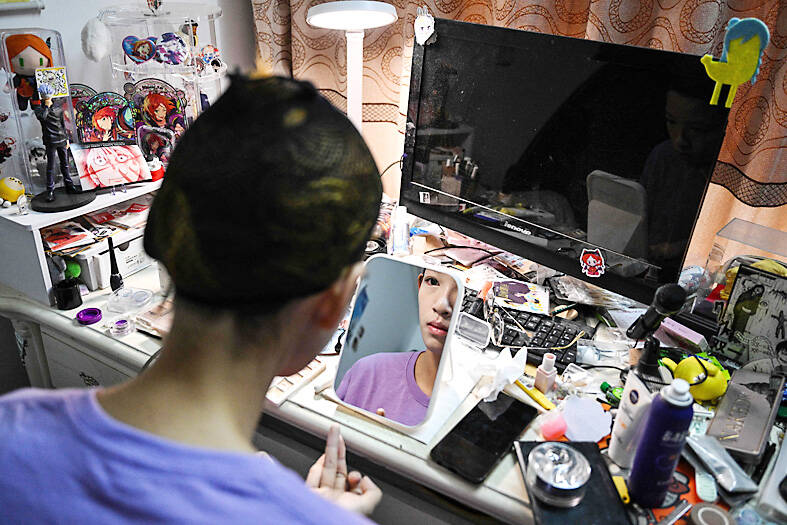During her final years of high school, Chinese teenager Xu Yunting found an unusual way to make some pocket money: transforming herself into male video game characters and taking their female devotees on dates.
The trend, called “cos commissioning,” has gained traction in China recently, with social media posts garnering millions of views as an increasing number of young women use their purchasing power to engineer a meeting with their dream man in real life.
One early morning in Shanghai last month, Xu carefully inserted contacts to enlarge her irises and adjusted a tangerine wig to transform into “Jesse,” a character from the romance quest mobile game “Light and Night.” A tall and sensitive musician, he is one of five characters that woo players throughout the game — and for client Feng Xinyu, a vivacious 19-year-old, the ideal partner.

Photo: AFP
“I don’t have a boyfriend because I’m not interested in 3D men,” Feng said, using a term for “real-life” men. “I like anime characters a little bit more, they’re more appealing to me.”
“Light and Night,” made by tech giant Tencent and aimed squarely at young women, promises a “brand-new interactive experience of highly immersive love.”
Players like Feng, who form strong emotional connections with characters in such games, are known as “dream girls” — and cos commissioning takes the immersion to the next level by dragging those 2D beaus off the screen and into the real world. Feng has commissioned Xu twice before, for a fee of around US$70. Last month, she spent US$2,800 on a multi-day trip with another Jesse cosplayer to a different province.

Photo: AFP
But she decided she preferred Xu’s portrayal and hired her for a third date. “We really click,” Feng said. “She’s just like the character from the game, it feels like we were meant to be together.”
RECONSTRUCTING GENDER RULES
Feng was waiting for Xu at a metro station, and grinned in unabashed delight when she spotted her. The two appeared relaxed, holding hands and chatting happily as they headed to their first activity.

Photo: AFP
Their date — all planned and paid for entirely by Feng —lasted all day, beginning with tea and ending with a hotpot meal and a romantic stroll. At both a doll-painting workshop and cake-decorating class they attended, they were one of many cos commission pairs. Staff at the latter business said they had noticed more and more couples coming in over the past year — sometimes dozens on busy days.
Part of the appeal, experts studying the phenomenon say, is that it gives young women a way to perform an idealized heteronormative relationship. Conservative social attitudes towards women remain widespread in China, often reinforced by state media and popular culture.
Aside from assuaging safety concerns, hiring a female cosplayer ensures a level of equality and understanding not necessarily guaranteed in a real-life relationship.

Photo: AFP
“I don’t think it’s important what gender the person being commissioned is,” Fudan University’s Tian Qian said. “What is important is that (the cosplayer) is a vessel, because the client needs a vehicle for their emotions.” Another academic, Zhou Zixing, wrote that cos commissioning allows women “to gain a voice that is fully respected by the opposite sex ... responding to, breaking, and reconstructing the gender rules of the real world.”
HEALING EFFECT
At the cake-decorating class, Feng leaned over the table, fondly watching Xu pipe generous amounts of icing onto a sponge cake. Afterwards, Xu gently helped Feng remove her apron, modelling Jesse’s gentlemanly behavior.
“The guys in the games are all quality guys,” Xu said. “I think (clients) will be able to improve their requirements in real life in terms of what they want from a man, so that they don’t settle for low-quality guys.”
Her mother Fang Xiuqing admitted her initial reaction when she learned what Xu was doing was: “How could this happen to my daughter?” But she has since come around to the idea. “I don’t think it’s a profession, it’s a hobby,” said Fang. “She gets enjoyment from it, and she also brings joy to others.”
Tian said cos commissions can act as “emotional sustenance.” “Although this is a paid interaction, it still gives a sense of being seen, which has a certain healing effect to it.”

Mongolian influencer Anudari Daarya looks effortlessly glamorous and carefree in her social media posts — but the classically trained pianist’s road to acceptance as a transgender artist has been anything but easy. She is one of a growing number of Mongolian LGBTQ youth challenging stereotypes and fighting for acceptance through media representation in the socially conservative country. LGBTQ Mongolians often hide their identities from their employers and colleagues for fear of discrimination, with a survey by the non-profit LGBT Centre Mongolia showing that only 20 percent of people felt comfortable coming out at work. Daarya, 25, said she has faced discrimination since she

April 21 to April 27 Hsieh Er’s (謝娥) political fortunes were rising fast after she got out of jail and joined the Chinese Nationalist Party (KMT) in December 1945. Not only did she hold key positions in various committees, she was elected the only woman on the Taipei City Council and headed to Nanjing in 1946 as the sole Taiwanese female representative to the National Constituent Assembly. With the support of first lady Soong May-ling (宋美齡), she started the Taipei Women’s Association and Taiwan Provincial Women’s Association, where she

It is one of the more remarkable facts of Taiwan history that it was never occupied or claimed by any of the numerous kingdoms of southern China — Han or otherwise — that lay just across the water from it. None of their brilliant ministers ever discovered that Taiwan was a “core interest” of the state whose annexation was “inevitable.” As Paul Kua notes in an excellent monograph laying out how the Portuguese gave Taiwan the name “Formosa,” the first Europeans to express an interest in occupying Taiwan were the Spanish. Tonio Andrade in his seminal work, How Taiwan Became Chinese,

More than 75 years after the publication of Nineteen Eighty-Four, the Orwellian phrase “Big Brother is watching you” has become so familiar to most of the Taiwanese public that even those who haven’t read the novel recognize it. That phrase has now been given a new look by amateur translator Tsiu Ing-sing (周盈成), who recently completed the first full Taiwanese translation of George Orwell’s dystopian classic. Tsiu — who completed the nearly 160,000-word project in his spare time over four years — said his goal was to “prove it possible” that foreign literature could be rendered in Taiwanese. The translation is part of